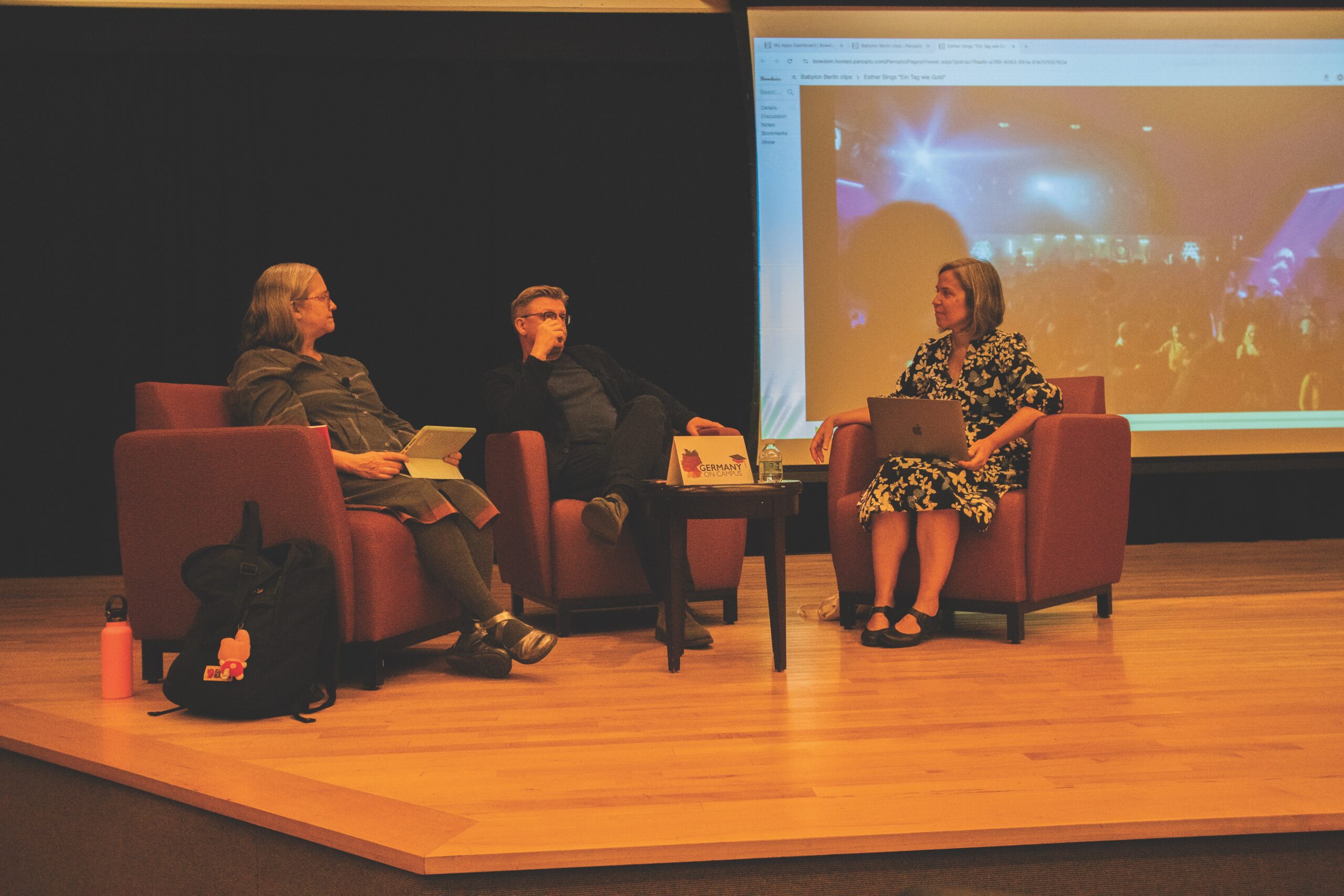TV writer Handloegten speaks on recreating German Weimar Republic for “Babylon Berlin”
September 13, 2024
 Isa Cruz
Isa CruzAudience members who gathered in Kresge Auditorium yesterday evening heard retellings of life in Germany’s Weimar Republic as depicted in the TV show “Babylon Berlin.”
Hank Handloegten, one of the show’s three creators, writers and directors, came to campus after connecting with Jill Smith, associate professor of German and the chair of the German department. Smith, who recently co-edited the first scholarly volume on “Babylon Berlin,” noted the show’s broad political, historical and cultural themes, as well as its celebrated costumes and music.
“It’s really beautifully filmed, it’s cleverly written [and] it’s controversial in the sense that it takes place in the late 1920s and early 1930s in Berlin, at the end of the Weimar Republic,” Smith said in an interview with the Orient prior to the talk. “Most of us know that in 1933, in January, Hitler took over. And so there’s a fascination with the Weimar Republic and its ending.”
The show’s fourth and most recent season takes place in the early years of the Great Depression, tracing historical shifts including changes in Jewish communities and a surge in right-wing political movements. Handloegten said that the show was created with the goal of accurately depicting the late Weimar period.
“We started as cinephiles,” Handloegten said of himself and his co-creators. “The three of us were always talking about Weimar and about this strange phenomenon that in German theater, Weimar’s pretty underrepresented…. We always tell the story from the perspective of our characters, and we stick to things that actually happened.”
Smith’s co-edited book on the series, “Babylon Berlin, German Visual Spectacle and Global Media Culture,” incorporates perspectives on art, fashion, women’s roles, political life and more during the end of the Weimar Republic. Hester Baer, professor of German studies at the University of Maryland and the book’s co-editor, also spoke with Handloegten at yesterday evening’s event and at a book talk earlier in the afternoon.
Baer and Smith have both focused their research on women’s work and status (as prostitutes, writers and activists) in Germany’s history. They praised Handloegten for including Weimar women’s writing and art as reference texts in the show.
“Jill and I were especially thrilled to see increased references to women creators from the Weimar period … women writers especially,” Baer said.
Handloegten’s visit was sponsored by the German, art history, music, history and theater and dance departments, as well as the cinema studies and gender, sexuality and women’s studies programs. Funding for Handloegten’s visit was also enabled by the German Embassy’s “Germany on Campus” initiative. The audience reflected this interdisciplinary support, with faculty, staff, community members and students from departments such as German and cinema studies in attendance.
The more than 3,000-mile journey to Maine was particularly exciting for Handloegten, who had never before seen New England. In an interview before the talk, he noted that the show had not previously been recognized in an academic context, though it has been widely screened in German and media studies courses across colleges and universities.
“In this atmosphere there’s a certain peace,” Handloegten said. “It’s very, very nice coming from a place like Berlin, where everything is chaotic…. It’s really exciting.”
Bowdoin community members were equally glad to welcome Handloegten to Bowdoin.
“I know people in facilities who are fans who are coming. I know physics and math professors who are coming,” Smith said. “Some are fans of the show, some want to learn more.”
At intervals throughout the talk, Kresge’s lights were dimmed and audience members sat forward in their seats to view clips from the show’s fourth season. The first clip, a dance scene set in the Moka Efti club, featured an original song and was filmed by Handloegten himself. Each clip was screened in German with English subtitles.
Sisters Chloe Sheahan ’26 and Hazel Sheahan ’28, both students in elementary German this semester, attended the talk in the hopes of practicing their language skills.
“We just wanted to expose ourselves to the language, to hear more German as it is in the show,” Hazel said. “So we figured, why not come?”
The talk was followed by a Q&A and a reception where Gelato Fiasco was served.
“Gelato Fiasco even let us rename some of our signature flavors after Babylon Berlin,” Smith said. “The espresso chip is now Moka Efti which is the famous club featured in the show.”

Comments
Before submitting a comment, please review our comment policy. Some key points from the policy: